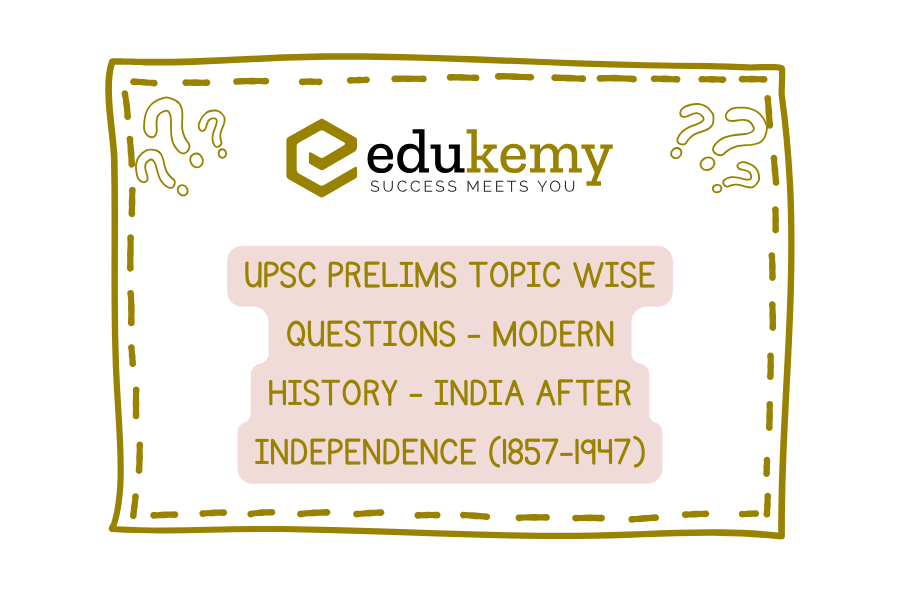Navigating through the labyrinth of India’s post-independence history is akin to unraveling a tapestry interwoven with myriad narratives of triumphs, struggles, and transformations. The UPSC Prelims, with its discerning gaze on Modern History, serves as a litmus test for aspirants, demanding a profound understanding of the nation’s trajectory after gaining independence from colonial rule. From the euphoria of newfound freedom to the challenges of nation-building, every facet of India’s post-independence journey is scrutinized through a spectrum of questions, delving into socio-political dynamics, economic policies, and cultural metamorphosis. As aspirants delve into the UPSC Prelims Topic Wise Questions on Modern History – India after Independence, they embark on a voyage to grasp the nuances of a nation in flux, where the echoes of the past reverberate in the contours of the present.
Contents
- 1 Q1. At the time of partition of India, which one of the following provinces of British India came forward with a plan for a united and independent existence? (2000)
- 2 Q2. The Balkan Plan for fragmentation of India was the brainchild of (2000)
- 3 Q3. President of Indian National Congress at the time of partition of India (2002)
- 4 Q4. Consider the following statements. (2007)
- 5 Q4. The Radcliffe Committe was appointed to (2013)
- 6 Q5. Consider the following statements. (2021)
- 7 In case you still have your doubts, contact us on 9811333901.
Q1. At the time of partition of India, which one of the following provinces of British India came forward with a plan for a united and independent existence? (2000)
(a) Punjab
(b) Assam
(c) Bengal
(d) Bihar
Ans. (a)
During the partition of British India into the Dominion of India and the Dominion of Pakistan, Punjab province proposed a plan for a unified and independent existence. Following the partition, eleven provinces (Ajmer-Merwara-Kekri, Andaman and Nicobar Islands, Bihar, Bombay, Central Provinces and Berar, Coorg, Delhi, Madras, Panth-Piploda, Orissa, and the United Provinces) became part of India, while three (Baluchistan, North-West Frontier, and Sindh) joined Pakistan. Additionally, three provinces (Punjab, Bengal, and Assam) were divided between India and Pakistan.
Q2. The Balkan Plan for fragmentation of India was the brainchild of (2000)
(a) W Churchil
(b) MA Jinnah
(c) Lord Mountbatten
(d) VP Menon
Ans. (c)
The ‘Balkan Plan’ originated from Lord Mountbatten’s vision. Authorized by the British government to address the Indian situation, Mountbatten swiftly realized that facilitating a transfer of power to a single central Constituent Assembly for India was unattainable. The Indian National Congress and the Muslim League failed to reach consensus on terms that allowed for the creation of separate dominions, such as Pakistan.
Q3. President of Indian National Congress at the time of partition of India (2002)
(a) C Rajagopalachari
(b) JB Kripalani
(c) Jawaharlal Nehru
(d) Maulana Abul Kalam
Ans. (b)
JB Kripalani held the position of President of the Indian National Congress during the partition of India. Prior to Kripalani, Jawaharlal Nehru served as the President. Following Kripalani’s tenure, Pattabhi Sitaraimayya assumed the presidency in 1948 and 1949.
Q4. Consider the following statements. (2007)
1. Jawaharlal Nehru was in his fourth term as the Prime Minister of India at the time of his death.
2. Jawaharlal Nehru represented Rae Bareilly constituency as a Member of Parliament.
3. The first Non-Congress Prime Minister of India assumed the office in the year 1977.
Which of the statement(s) given above is/are correct?
(a) 1 and 2
(b) Only 3
(c) Only 1
(d) 1 and 3
Ans. (d)
Statements (1) and (3) are accurate. Jawaharlal Nehru assumed office as Prime Minister in 1947 for his initial term, followed by a re-election in 1952 for his second term. Subsequently, he secured another term after the 1957 elections, and finally, he served his fourth term following his victory in the 1962 elections.
Morarji Desai led as Prime Minister from March 24, 1977, to July 28, 1979, spearheading the multi-party coalition Janata Party, marking India’s first non-Congress government.
Q4. The Radcliffe Committe was appointed to (2013)
(a) solve the problem of minorities in India
(b) give effect to the Independence Bill
(c) delimit the boundaries between India and Pakistan
(d) enquire into the riots in East Bengal
Ans. (c)
The Radcliffe Committee’s task was to define the borders between India and Pakistan. Formed in 1947, just before both nations gained independence from Britain, it was commissioned by Viceroy Lord Mountbatten. Chaired by Sir Cyril Radcliffe, the committee comprised four members from the Muslim League.
Q5. Consider the following statements. (2021)
1. 21st February is declared to be the International Mother Language Day by UNICEF.
2. The demand that Bangla has to be one of the national languages was raised in the Constituent Assembly of Pakistan.
Which of the above statement(s) is/are correct?
(a) Only 1
(b) Only 2
(c) Both 1 and 2
(d) Neither 1 nor 2
Ans. (b)
Statement (2) accurately highlights the demand for Bangla to be recognized as one of the national languages, which emerged during the sessions of the Constituent Assembly of Pakistan. Following Pakistan’s establishment in 1948, the government designated Urdu as the sole national language, despite the fact that Bengali, or Bangla, was the predominant language spoken by the majority of people in both East Pakistan and West Pakistan.
In case you still have your doubts, contact us on 9811333901.
For UPSC Prelims Resources, Click here
For Daily Updates and Study Material:
Join our Telegram Channel – Edukemy for IAS
- 1. Learn through Videos – here
- 2. Be Exam Ready by Practicing Daily MCQs – here
- 3. Daily Newsletter – Get all your Current Affairs Covered – here
- 4. Mains Answer Writing Practice – here

